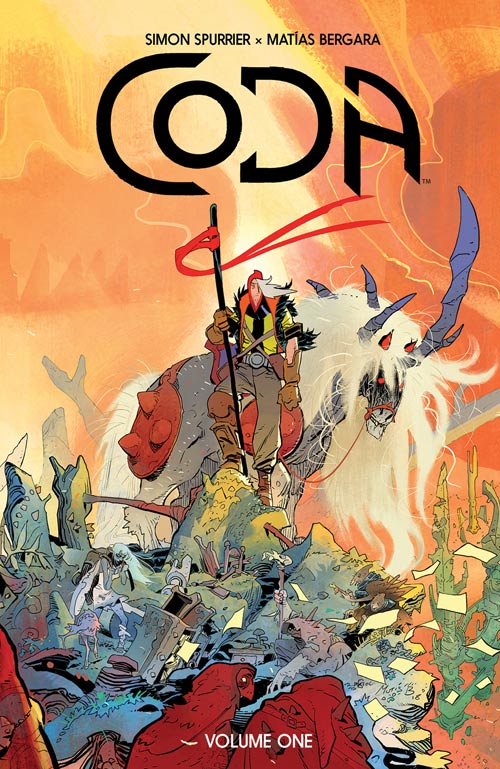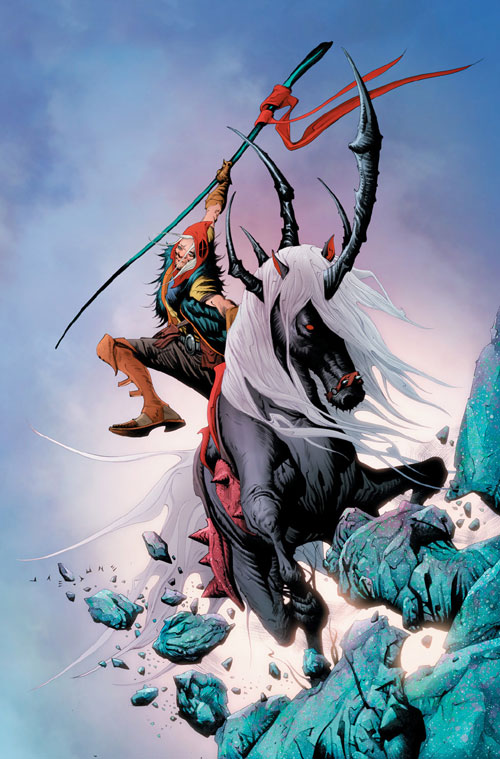A Broken Fantasy Cuts Loose In Coda
Nov 10, 2018
 |
by Vince Brusio
A world of fantasy does not sound like a heavy metal reprise from 80s metal band Triumph. No, it sounds like the undead corpse of a dragon. We hear the crumbling remnants of a town-sized weapon. We hear the giant’s footfalls as he labors to haul a bandit-city behind him. It is a cacophony of noise after an apocalypse, and writer Si Spurrier sits down with us in this PREVIEWSworld Exclusive interview to describe these deafening decibels which have a home in Coda, now available in trade paperback from BOOM! Studios.
The Coda Volume 1 TP (NOV181313) can now be pre-ordered in the November PREVIEWS comic shop catalog.
**********
Vince Brusio: ‘Tis your lucky day, Simon. With this interview, you’re not limited to just a few short sentences to describe Coda #1 for our readers. So with your renowned gift of verbiage, please describe for us in technicolor how Coda #1 is a spike to our cerebellums. How shall it make us dance?
Si Spurrier: Sadly my renowned gift for verbiage has caromed dolefully into my injurious working schedule with profound, nay deleterious, effect upon my lexiphanicism.
And since Coda is very much about clearing the decks of all the pompous old frills and wanky affectations of the Swords’n’sorcery genre, let’s do away with the showy bigwordery right here too, and aim for substance over surplus.
Here’s what you need to know: as gasoline is to Mad Max, so magic is to Coda.
Coda is what happens to a high fantasy world after the bad guys win. Think World of Warcraft, or any one of the billions of other dreary sub-Tolkien swords’n’sorcery realities. Seems like every five minutes a new Dark Lord or Demon Maester, or whoever - usually with an unpronounceable name - is popping up to try and end the world. Sooner or later one of them’s going to succeed. Well, our story starts a few years later.
Basically I got so fed up reading the same tired old cliches being trotted out over and over, in fantasy stories, that I decided the most creative (and kindest) approach was to drag the whole genre outside and shoot it.
In the word of Coda, the net upshot of that apocalypse was: no new magic. And that’s a pretty big deal for a world which previously ran on the stuff.
So most of the people we encounter are busy either trying to get by without it, or busy scavenging for the dregs that remain. And stuck in the middle, caught up in the mother of all turf wars between frankly insane rival factions, is our hero: a former bard called Hum. At least, that’s what people call him, since “hm” is often all he says. Instead he records his most personal hopes and dreams in a diary.
So on the one hand Coda is a post-apocalyptic survival story, as our hero crosses this extraordinary landscape with nothing but an ill-tempered mutant unicorn (technically a pentacorn) for company. But the beating heart of the narrative is a twisty love story, as we discover his driving goal: to find and save his wife.
Aaaand - since it’s me writing this - Hum’s a bit of a complicated chap, and you can’t always believe everything he says... even when he’s saying it to himself. So perhaps his goals aren’t quite as clear-cut as they seem.
Vince Brusio: The artwork for this book! Talk about Ralph Bakshi overtones. It’s Wizards meets Fire and Ice mixed into Heavy Metal — then spliced into The Lord of the Rings William S. Burroughs-style. Are these the cinematic references responsible for your landscapes? Were they all drawn from Bergara’s perspective, or did you have certain requests for the visuals?
Si Spurrier: It’s very much Matias’s tone to set — as is right and proper for a creator-owned story. I can suggest the raw substance — whether it’s the undead corpse of a dragon, the crumbling remnants of an impossible town-sized weapon, or the last pestilent giant dumbly hauling a bandit-city behind him — but it’s Matias who gives it exceptional life. What’s emerged is this vibrant, fertile, colorful place quite unlike any other notion of a post-apocalyptic wilderness. In this world the end of magical civilization is very much not the end of the story; leading to new and strange forms of life.
I couldn’t tell you precisely what influences Matias holds in his heart, but what appears on the page has a lot of the very best of Moebius. Honestly, Coda feels like no other comic I’ve ever seen, but the closest vibe you’d get would be a European B.D. style fantasy — albeit with all the fantasy cliches mercilessly ground underfoot.
It’s very strange, extremely readable, and quite possibly the best thing I’ve ever worked on.
Vince Brusio: Tell us about the players in this surreal stage show. Who is our hero? Are there any heroes? As this story takes place in a “Weird Wasteland” is the term “hero” far removed from the actual facts on the ground?
Si Spurrier: I mentioned Hum already. I’ve taken to calling him “a lonely misanthrope.” Meaning that he struggles to be around other people, who after all do tend to be untrustworthy, treacherous and irritating — but he can’t bear to be on his own for too long either.
He has two emotional anchors. The first is the Nag, his reliable but murderous mutant unicorn. (Well, technically a Pentacorn.) The Nag’s sort of playfully psychotic — definitely a monster you want on your side — and, despite having the power of speech only ever shouts grawlix (£$%@) swearwords. The Nag’s a pretty big deal, since Hum has a disability — one of his legs is gone — so having a means of locomotion, as well as a formidable fighting advantage, is critical.
The other comfort is Serka, his wife. The one and only person he’s ever met with whom he could happily spend all his time. As our story begins Hum explains in his diary that she’s being held captive, and he’ll do anything to get her back. He’s sort of built her up into a slightly unhealthy state of dependency. All, as you’d expect, is not as it seems.
Loads of other characters in the mix, but I think my favorite is the Murkrone. She’s an irascible and likeable old mermaid merchant who crisscrosses our world in a wheeled bathtub, swindling and extorting. She has a tragic backstory we’ll get to know quite early in the story.
Vince Brusio: The scope of this story is huge. Will a trade paperback be big enough to contain it?
Si Spurrier: The moment we all started work on it — artists, editors, letterers and me — we all intuited we had something very special on our hands. We wanted to give it room to breathe. As I so frequently complain, stories set in new worlds all too often feel forced to revolve around world-changing stakes, whereas I believe genre fiction is a thousand times more successful when the world, which should feel functional no matter how insane it is, is pushed into the background and the characters are allowed to take center stage. So it is with Coda. We’ve given ourselves the space to explore and the time to develop threads, but most importantly we’ve booked ourselves a lot of drama-time with Hum and our other characters.
Vince Brusio: What challenges you the most in writing this story? Is it trying to convey your ideas so that they’re best rendered visually? Is it the syntax or dialect of your characters? What eats up the clock?
Si Spurrier: Interviews.
Joking, joking.
I tend to get very carried away with Coda. I feel I know all the characters so well it’s often a challenge to steer them in the right direction, rather than just dreamily enjoying their company. Most of the notes I get from Eric and Gavin, editors extraordinaire, are to that effect. Stay on target, stay on target.
The other big challenge is Hum’s diary entries. For a man of few words he’s enviably expressive when setting his thoughts on paper, and that provides the comic book writer a lot of cool opportunities. Words which resonate or juxtapose with their attendant images are one of the things comics do better than any medium, so it’s worth taking the time to get right. The effect — which somehow makes seething action into airy meditation, without losing any of the pace of thrill — is very compelling.
 |
**********
Vince Brusio writes about comics, and writes comics. He is the long-serving Editor of PREVIEWSworld.com, the creator of PUSSYCATS, and encourages everyone to keep the faith...and keep reading comics.




